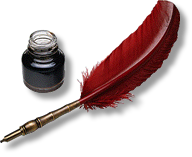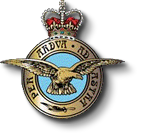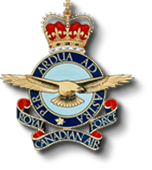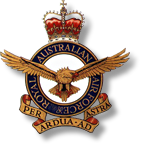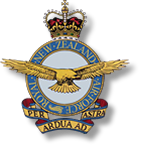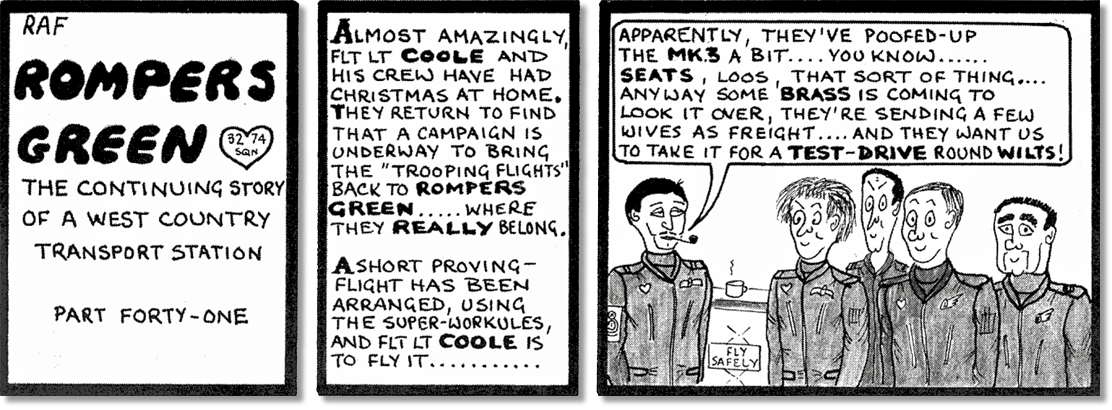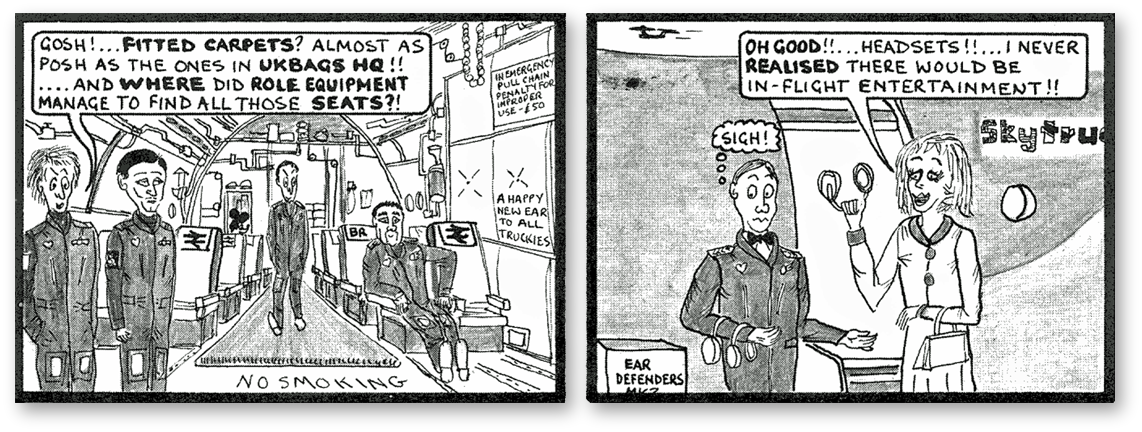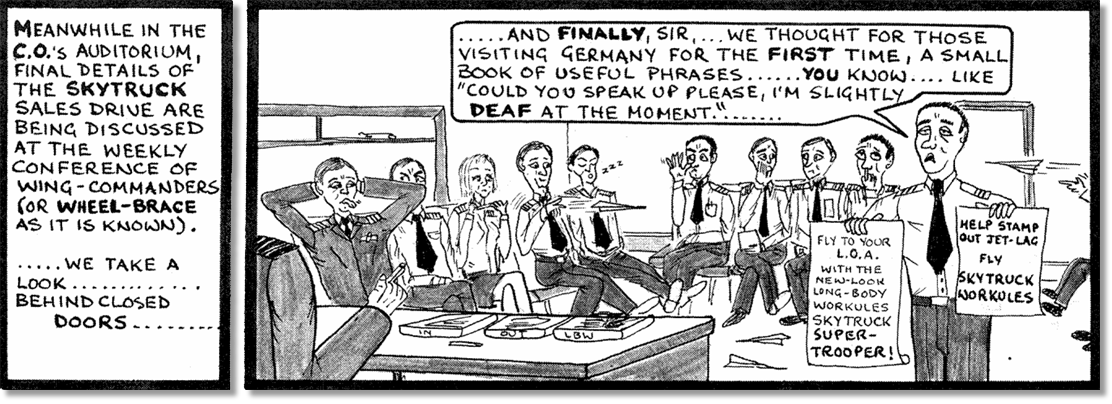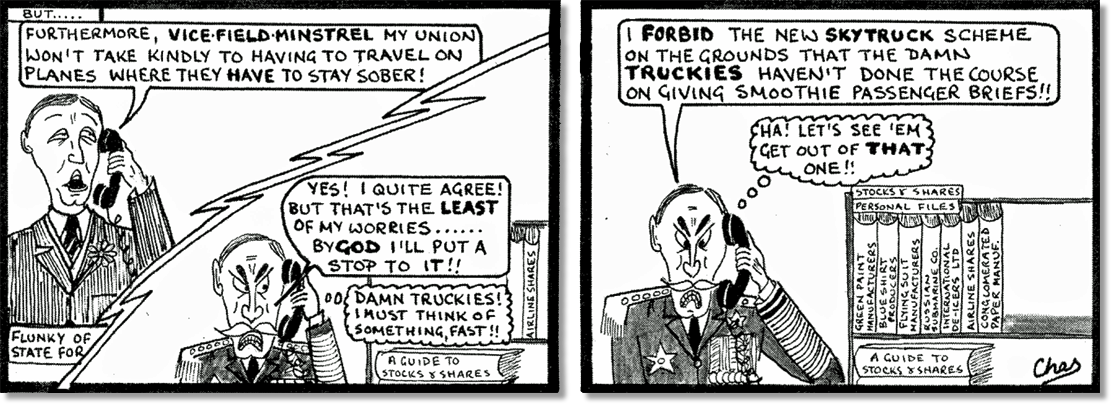

From: Don Hunter, Saint Quentin de Caplong
Subject: Kabul
Tony,
When the dust has settled and security vetting is agreed, it would be most interesting to hear from those MAMS types who have clearly been in the thick of it in recent days. This is not a drill.
Subject: Kabul
Tony,
When the dust has settled and security vetting is agreed, it would be most interesting to hear from those MAMS types who have clearly been in the thick of it in recent days. This is not a drill.

I wonder if the likes of Andy Spinks, with his relatively recent service and very senior contacts might be able to make this happen, when the time is right? All very raw - on so many levels - at the moment, but there is clearly a huge tale to tell amongst the brotherhood of Movers.
All best wishes to you and massive respect to those Movers (and frankly everyone) of all nations involved.
Best
Don Hunter
All best wishes to you and massive respect to those Movers (and frankly everyone) of all nations involved.
Best
Don Hunter

Details of the Evacuation Effort by Country
UNITED STATES: The U.S. military will continue evacuating people from Kabul airport until Aug. 31 if needed, but will prioritize the removal of U.S. troops and military equipment on the last couple of days, the Pentagon has said. Washington has evacuated 5,400* U.S. citizens since Aug. 14, according to the U.S. government. There were still about 350 U.S. citizens in Afghanistan trying to leave the country, a State Department spokesman said. [*See Qatar and United Arab Emirates]
BRITAIN: Britain's last military flight left Kabul late on Saturday after evacuating more than 15,000 people in the two weeks since the Taliban took control of Afghanistan, the defence ministry said.
CANADA: Canadian forces in Kabul ended evacuation efforts for their citizens and Afghans on Thursday, acting chief of the defence staff General Wayne Eyre said. He said Canada had evacuated or facilitated the evacuation of about 3,700 Canadian and Afghan citizens.
GERMANY: Germany ended evacuation flights on Thursday. The German military has evacuated 5,347 people, including more than 4,100 Afghans. Germany previously said it had identified 10,000 people who needed to be evacuated, including Afghan local staff, journalists and human rights activists. About 300 German citizens remain in Afghanistan, a spokesman for the foreign office in Berlin said on Friday.
FRANCE: The French Defence Ministry said on Friday it had finished its evacuation effort from Afghanistan. During the operation, nearly 3,000 people, including more than 2,600 Afghans, had been brought to France.
ITALY: Italy evacuated 5,011 people, including 4,890 Afghan nationals, among them 1,301 women and 1,453 children, a defence ministry statement said. The last evacuation flight left on Friday.
SWEDEN: Sweden has ended its evacuation mission in Kabul, Swedish Foreign Minister Ann Linde said on Friday. She said that a total of 1,100 people had been evacuated, including all locally employed embassy staff and their families.
BELGIUM: Prime Minister Alexander De Croo said on Thursday Belgium had ended its evacuation operations. Just over 1,400 people were evacuated, with the last flight arriving in the Pakistan capital of Islamabad on Wednesday night, he said.
IRELAND: Ireland's foreign ministry said that it had evacuated 36 Irish citizens after the completion of an emergency consular mission on Thursday. It said it was now aware of approximately 60 Irish citizens and family members plus a further 15 Afghan citizens with Irish residency who are still in the country and have requested assistance, far more than they had initially estimated.
POLAND: Poland has evacuated about 900 people from Afghanistan, including about 300 women and 300 children, Prime Minister Mateusz Morawiecki said on Thursday.
HUNGARY: Hungary has ended evacuations in Afghanistan after airlifting 540 people, including Hungarian citizens and Afghans and their families who worked for Hungarian forces previously, Defence Minister Tibor Benko said on Thursday.
DENMARK: Denmark made its last evacuation flight out of Kabul on Wednesday with the remaining diplomatic staff and military personnel, according to its defence ministry. Denmark has airlifted about 1,000 people from Afghanistan since Aug. 14, including diplomatic staff, their families, former interpreters, Danish citizens as well as people from allied countries, the ministry said.
UKRAINE: Ukraine has evacuated of all of its citizens who wanted to leave, the president's chief of staff said on Saturday. In all, it has flown out more than 600 people including foreign journalists, rights activists, women and children, Andriy Yermak said.
AUSTRIA: Austria is not operating its own flights and is relying on Germany and other countries to help with its evacuation. Foreign Minister Alexander Schallenberg told national broadcaster ORF on Wednesday 89 people with Austrian citizenship or residency had been airlifted out, while another two to three dozen people were still in Afghanistan.
SWITZERLAND: Switzerland, which is relying on Germany and the United States to help with its evacuation efforts via Tashkent, has got 292 people out of Afghanistan, Foreign Minister Ignazio Cassis said on Tuesday. There were still 15 Swiss citizens in Afghanistan, but no more Swiss evacuation flights were planned.
THE NETHERLANDS: The Dutch government said on Thursday it had evacuated 2,500 people from Afghanistan since Aug. 15, with about 1,600 of them brought to the Netherlands. The Dutch ambassador left on the final flight on Thursday. The Dutch have no diplomatic presence left in the country.
SPAIN: Spain has concluded its evacuation of personnel from Afghanistan, the government said. Two military planes carrying the last 81 Spaniards out of Kabul arrived in Dubai early on Friday, a government statement said. The planes were also carrying four Portuguese soldiers and 83 Afghans who had worked with NATO countries. Over the course of its rescue mission Spain evacuated 1,898 Afghans who had worked with Western countries, the United Nations or the European Union.
TURKEY: Turkey has evacuated all troops and civilians from Afghanistan aside from a small "technical group" left behind, President Tayyip Erdogan said on Friday. Turkey has evacuated at least 1,400 people from Afghanistan, including about 1,000 Turkish citizens, Foreign Minister Mevlut Cavusoglu said earlier this week.
QATAR: Qatar said on Thursday it had helped evacuate more than 40,000 people to Doha and "evacuation efforts will continue in the coming days in consultation with international partners".
UNITED ARAB EMIRATES: The UAE said on Thursday it had helped evacuate 36,500 people to date, including 8,500 coming to the UAE via its national carriers or airports.
INDIA: India has airlifted 565 people from Afghanistan, most of them embassy personnel and citizens living there but also dozens of Afghans including Afghan Sikhs and Hindus, a government official said.
AUSTRALIA: Australian Prime Minister Scott Morrison said on Friday that Australia had evacuated 4,100 people, including over 3,200 citizens and Afghans with Australian visas, over nine days, with the last planned flight leaving before the airport attack. The other evacuees were from coalition partners. Morrison acknowledged some Australian visa holders remained in Afghanistan though he did not know exact numbers. Australia is committed to bringing at least 3,000 more people out over coming months as part of a humanitarian programme, Home Affairs Minister Karen Andrews said.
NEW ZEALAND: New Zealand’s Defence Force ran three flights out of Kabul, and the last planned flight had left before the attack, a government statement said. No NZDF personnel were in Kabul at the time of the explosions and no New Zealand evacuees were left within Kabul airport. According to preliminary numbers, at least 276 New Zealand nationals and permanent residents, their families and other visa holders were evacuated, it said.
Reuters
BRITAIN: Britain's last military flight left Kabul late on Saturday after evacuating more than 15,000 people in the two weeks since the Taliban took control of Afghanistan, the defence ministry said.
CANADA: Canadian forces in Kabul ended evacuation efforts for their citizens and Afghans on Thursday, acting chief of the defence staff General Wayne Eyre said. He said Canada had evacuated or facilitated the evacuation of about 3,700 Canadian and Afghan citizens.
GERMANY: Germany ended evacuation flights on Thursday. The German military has evacuated 5,347 people, including more than 4,100 Afghans. Germany previously said it had identified 10,000 people who needed to be evacuated, including Afghan local staff, journalists and human rights activists. About 300 German citizens remain in Afghanistan, a spokesman for the foreign office in Berlin said on Friday.
FRANCE: The French Defence Ministry said on Friday it had finished its evacuation effort from Afghanistan. During the operation, nearly 3,000 people, including more than 2,600 Afghans, had been brought to France.
ITALY: Italy evacuated 5,011 people, including 4,890 Afghan nationals, among them 1,301 women and 1,453 children, a defence ministry statement said. The last evacuation flight left on Friday.
SWEDEN: Sweden has ended its evacuation mission in Kabul, Swedish Foreign Minister Ann Linde said on Friday. She said that a total of 1,100 people had been evacuated, including all locally employed embassy staff and their families.
BELGIUM: Prime Minister Alexander De Croo said on Thursday Belgium had ended its evacuation operations. Just over 1,400 people were evacuated, with the last flight arriving in the Pakistan capital of Islamabad on Wednesday night, he said.
IRELAND: Ireland's foreign ministry said that it had evacuated 36 Irish citizens after the completion of an emergency consular mission on Thursday. It said it was now aware of approximately 60 Irish citizens and family members plus a further 15 Afghan citizens with Irish residency who are still in the country and have requested assistance, far more than they had initially estimated.
POLAND: Poland has evacuated about 900 people from Afghanistan, including about 300 women and 300 children, Prime Minister Mateusz Morawiecki said on Thursday.
HUNGARY: Hungary has ended evacuations in Afghanistan after airlifting 540 people, including Hungarian citizens and Afghans and their families who worked for Hungarian forces previously, Defence Minister Tibor Benko said on Thursday.
DENMARK: Denmark made its last evacuation flight out of Kabul on Wednesday with the remaining diplomatic staff and military personnel, according to its defence ministry. Denmark has airlifted about 1,000 people from Afghanistan since Aug. 14, including diplomatic staff, their families, former interpreters, Danish citizens as well as people from allied countries, the ministry said.
UKRAINE: Ukraine has evacuated of all of its citizens who wanted to leave, the president's chief of staff said on Saturday. In all, it has flown out more than 600 people including foreign journalists, rights activists, women and children, Andriy Yermak said.
AUSTRIA: Austria is not operating its own flights and is relying on Germany and other countries to help with its evacuation. Foreign Minister Alexander Schallenberg told national broadcaster ORF on Wednesday 89 people with Austrian citizenship or residency had been airlifted out, while another two to three dozen people were still in Afghanistan.
SWITZERLAND: Switzerland, which is relying on Germany and the United States to help with its evacuation efforts via Tashkent, has got 292 people out of Afghanistan, Foreign Minister Ignazio Cassis said on Tuesday. There were still 15 Swiss citizens in Afghanistan, but no more Swiss evacuation flights were planned.
THE NETHERLANDS: The Dutch government said on Thursday it had evacuated 2,500 people from Afghanistan since Aug. 15, with about 1,600 of them brought to the Netherlands. The Dutch ambassador left on the final flight on Thursday. The Dutch have no diplomatic presence left in the country.
SPAIN: Spain has concluded its evacuation of personnel from Afghanistan, the government said. Two military planes carrying the last 81 Spaniards out of Kabul arrived in Dubai early on Friday, a government statement said. The planes were also carrying four Portuguese soldiers and 83 Afghans who had worked with NATO countries. Over the course of its rescue mission Spain evacuated 1,898 Afghans who had worked with Western countries, the United Nations or the European Union.
TURKEY: Turkey has evacuated all troops and civilians from Afghanistan aside from a small "technical group" left behind, President Tayyip Erdogan said on Friday. Turkey has evacuated at least 1,400 people from Afghanistan, including about 1,000 Turkish citizens, Foreign Minister Mevlut Cavusoglu said earlier this week.
QATAR: Qatar said on Thursday it had helped evacuate more than 40,000 people to Doha and "evacuation efforts will continue in the coming days in consultation with international partners".
UNITED ARAB EMIRATES: The UAE said on Thursday it had helped evacuate 36,500 people to date, including 8,500 coming to the UAE via its national carriers or airports.
INDIA: India has airlifted 565 people from Afghanistan, most of them embassy personnel and citizens living there but also dozens of Afghans including Afghan Sikhs and Hindus, a government official said.
AUSTRALIA: Australian Prime Minister Scott Morrison said on Friday that Australia had evacuated 4,100 people, including over 3,200 citizens and Afghans with Australian visas, over nine days, with the last planned flight leaving before the airport attack. The other evacuees were from coalition partners. Morrison acknowledged some Australian visa holders remained in Afghanistan though he did not know exact numbers. Australia is committed to bringing at least 3,000 more people out over coming months as part of a humanitarian programme, Home Affairs Minister Karen Andrews said.
NEW ZEALAND: New Zealand’s Defence Force ran three flights out of Kabul, and the last planned flight had left before the attack, a government statement said. No NZDF personnel were in Kabul at the time of the explosions and no New Zealand evacuees were left within Kabul airport. According to preliminary numbers, at least 276 New Zealand nationals and permanent residents, their families and other visa holders were evacuated, it said.
Reuters

Royal Air Force Extracts Beleaguered SAS Forces from Kandahar in Dramatic Night-Time Operation
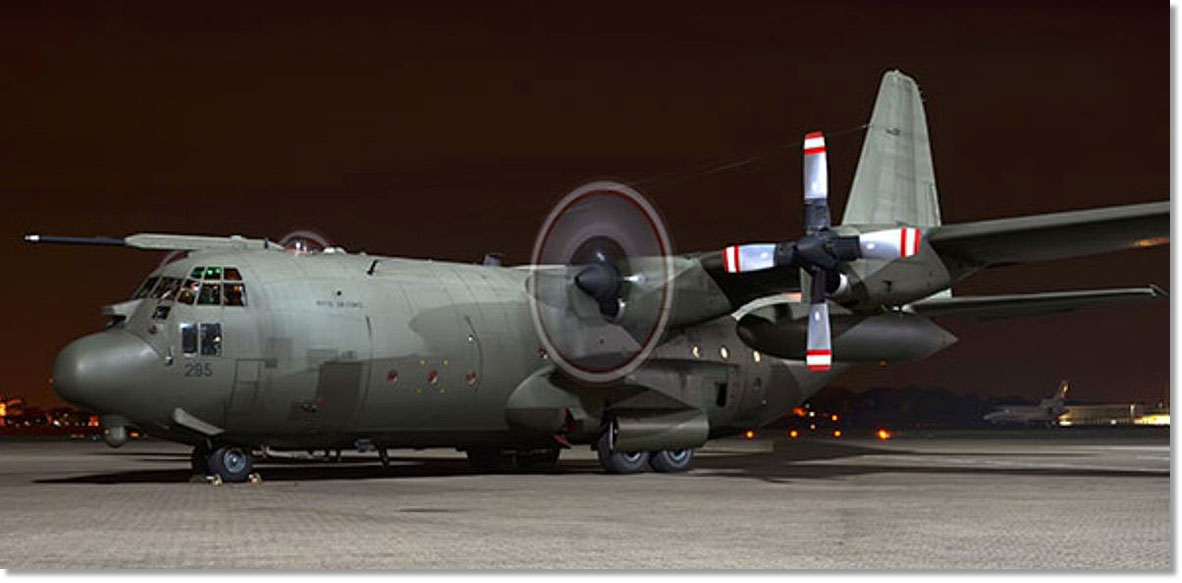
A Hercules from 47 squadron's Special Forces Flight made a dramatic landing in the dead of night with the crew wearing digital night-vision goggles on Wednesday of last week: their mission was to extract 20 SAS troops.
"It was a very hush, hush mission. Kandahar had fallen to the Taliban on Friday and the guys were down there for five days after that. The enemy were rampant and killing a lot of Afghan Special Forces whom the SAS had been working with. So it was a very urgent mission. Credit to the Hercules crew from 47 Squadron for landing the aircraft at night on rough terrain and getting her airborne again with the guys and their equipment aboard. It was textbook," said a source.
www.eutoday.net
"It was a very hush, hush mission. Kandahar had fallen to the Taliban on Friday and the guys were down there for five days after that. The enemy were rampant and killing a lot of Afghan Special Forces whom the SAS had been working with. So it was a very urgent mission. Credit to the Hercules crew from 47 Squadron for landing the aircraft at night on rough terrain and getting her airborne again with the guys and their equipment aboard. It was textbook," said a source.
www.eutoday.net

From: Tony Street, Buffalo, NY
Subject: Hotel Stories
In October of 1981, I was working for a defense contractor in Florida, where it came to pass that myself and another employee, Bill, were seconded to Lockheed Aircraft, Marietta, Georgia to participate in a U.S. trade mission to China. This was a direct result of Nixon’s opening trade barriers with them. Our goal was to sell C130 Hercules aircraft to the Peoples Liberation Army (PLA). It was considered of such import that we were accompanied by two folks from the State Department.
Subject: Hotel Stories
In October of 1981, I was working for a defense contractor in Florida, where it came to pass that myself and another employee, Bill, were seconded to Lockheed Aircraft, Marietta, Georgia to participate in a U.S. trade mission to China. This was a direct result of Nixon’s opening trade barriers with them. Our goal was to sell C130 Hercules aircraft to the Peoples Liberation Army (PLA). It was considered of such import that we were accompanied by two folks from the State Department.
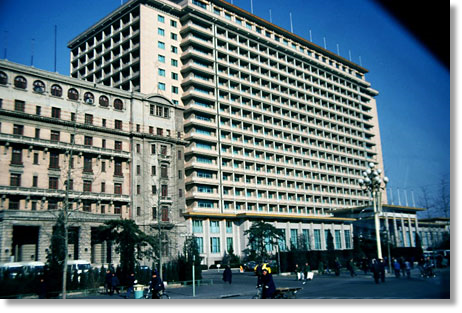
After a long, boring and tedious C130 trip from the U.S to Beijing, we arrived at what was then called the “Beijing Hotel”. This was an experience in itself. It was a huge monolithic structure consisting of two sections, right half of western design, the left, dark and dreary Russian.
We were greeted by the staff, given keys to our rooms, two to a room, and assisted upstairs (No tipping). My roomie was a huge Italian Lockheed guy also named Tony. We did not have to register, that was already done by the “Authorities,” a term that became part of our daily vocabulary!
Point of interest here: At the time there were only about 2500 hotel rooms in Beijing deemed by the authorities suitable for occupancy by “Westerners,” and all were always full. This created a situation whereby if there were 100 bods arriving from Honkers, an equal number must depart. Also, we were the first Westerners they have ever seen. We were tall and large and black and olive and white which must have boggled them. They never stopped staring.
We were greeted by the staff, given keys to our rooms, two to a room, and assisted upstairs (No tipping). My roomie was a huge Italian Lockheed guy also named Tony. We did not have to register, that was already done by the “Authorities,” a term that became part of our daily vocabulary!
Point of interest here: At the time there were only about 2500 hotel rooms in Beijing deemed by the authorities suitable for occupancy by “Westerners,” and all were always full. This created a situation whereby if there were 100 bods arriving from Honkers, an equal number must depart. Also, we were the first Westerners they have ever seen. We were tall and large and black and olive and white which must have boggled them. They never stopped staring.
The rooms were very early Holiday Inn, but clean and serviceable. The highlight being the two porcelain thermos’ that kept water almost at the boiling point for about 12 hours so one could make a variety of tea anytime; they were an engineering marvel and a gift to mankind. We never saw them being filled and we wondered if there were unseen forces at work.

After we settled in, we had a meeting downstairs in the bar of the cavernous lobby. The bar was standard US style with all the usual tipple and at U.S. prices (which surprised us as everything else was dirt cheap).
It was decided, by the State Department drones that we must, to have “face”, eat in the Chinese side of the dining room... err... Mess Hall as this was in the huge lobby (think Central Station). It held about 200 people where the western side held about 50. The cacophony of marble walls echoes at mealtimes was deafening and made un-shouted conversation impossible.
The food was excellent and plentiful. We were instructed by our drones that we must eat what was put in front of us, whether we liked it or not, and always leave some on our plate lest the cook thought his efforts lacking and we were still hungry. Burping was encouraged, apparently the louder the better (as judged by the burps coming across the divider between the two sides), sometimes we took it to the point of (our own) embarrassment.
It was decided, by the State Department drones that we must, to have “face”, eat in the Chinese side of the dining room... err... Mess Hall as this was in the huge lobby (think Central Station). It held about 200 people where the western side held about 50. The cacophony of marble walls echoes at mealtimes was deafening and made un-shouted conversation impossible.
The food was excellent and plentiful. We were instructed by our drones that we must eat what was put in front of us, whether we liked it or not, and always leave some on our plate lest the cook thought his efforts lacking and we were still hungry. Burping was encouraged, apparently the louder the better (as judged by the burps coming across the divider between the two sides), sometimes we took it to the point of (our own) embarrassment.

On the morning of our first trip to work, we dropped off our room keys at the houseboy’s desk, located beside the elevators. The lads promptly hung them on correspondingly numbered hooks. Upon our return that evening, we went to the desk and found our key missing. After a little, “Pointy-Talky,” one of the boy indicated that we should follow him, we did, and found our room door to be wide open. (A quick search found nothing to be missing). We found out that evening that it was considered to be “Bad Feng Shui,” coming home to a closed door.
A few days in, sitting in the bar after work, one of the crew saw some Chinese chaps coming in through a side door and going into a door that seemed to be another entrance to the bar. We sent out a fellow on a recon mission. He reported back, after a long absence, to report that there was, indeed another bar as we had thought. He also reported that the bar was a doppelganger but served Chinese beer and spirits at prices that were a half of what we were paying out front. The Chinese crowd did not seem to mind our daily presence, but, if they did, they were too polite, (or afraid), to broach the subject. After a couple of days however, there were smiles and raised glasses all around as we greeted and toasted each other.
There is a lot more to the story, but I’ve banged on long enough. Have to save something for next time. (For example, after a very successful day of airdrops and LAPES, one of the State Department lads got to celebrating our victory. He did so to the point where he was a no-show the next morning. The hotel doctor was summoned, he was diagnosed with alcohol poisoning and it was recommended that he had 24 hours of bed rest).
Cheers,
Tony
A few days in, sitting in the bar after work, one of the crew saw some Chinese chaps coming in through a side door and going into a door that seemed to be another entrance to the bar. We sent out a fellow on a recon mission. He reported back, after a long absence, to report that there was, indeed another bar as we had thought. He also reported that the bar was a doppelganger but served Chinese beer and spirits at prices that were a half of what we were paying out front. The Chinese crowd did not seem to mind our daily presence, but, if they did, they were too polite, (or afraid), to broach the subject. After a couple of days however, there were smiles and raised glasses all around as we greeted and toasted each other.
There is a lot more to the story, but I’ve banged on long enough. Have to save something for next time. (For example, after a very successful day of airdrops and LAPES, one of the State Department lads got to celebrating our victory. He did so to the point where he was a no-show the next morning. The hotel doctor was summoned, he was diagnosed with alcohol poisoning and it was recommended that he had 24 hours of bed rest).
Cheers,
Tony

From: Richard English (Air Radar – likes the newsletters)
Subject: Hotel Stories
I was the sole QAS (Quality Assurance Service) representitive on RAF Gan in the Maldive Islands with 11 RFP (Radio Fitting Party), where we were replacing all the electronics on the island in 1972-73. Gan closed for ever in 1976, what a waste.
Four of us decided we needed a 20-0-20 milliamp meter, the only one available was in Hong Kong. Off we flew in our VC10 that sadly went TBN in Singapore. There were no RAF stations in Singers any more, therefore we were put up in a very comfortable hotel for three nights until the kite was fixed.
On arrival in Honkers it was the weekend so we were forced to spend another three nights in a hotel in Kowloon for reasons that I can't remember. There, I bought a camphorwood chest, a Sony stereo system and and a camera plus we had another three nights of at-home civilisation!
Richard English
Subject: Hotel Stories
I was the sole QAS (Quality Assurance Service) representitive on RAF Gan in the Maldive Islands with 11 RFP (Radio Fitting Party), where we were replacing all the electronics on the island in 1972-73. Gan closed for ever in 1976, what a waste.
Four of us decided we needed a 20-0-20 milliamp meter, the only one available was in Hong Kong. Off we flew in our VC10 that sadly went TBN in Singapore. There were no RAF stations in Singers any more, therefore we were put up in a very comfortable hotel for three nights until the kite was fixed.
On arrival in Honkers it was the weekend so we were forced to spend another three nights in a hotel in Kowloon for reasons that I can't remember. There, I bought a camphorwood chest, a Sony stereo system and and a camera plus we had another three nights of at-home civilisation!
Richard English
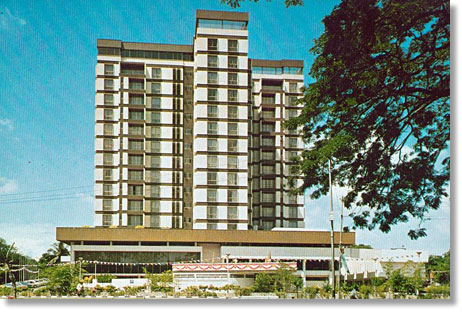
The Hotel Equatorial at the junction of Bukit
Timah and Stevens Roads in Singapore
Timah and Stevens Roads in Singapore

From: Jerry Allen, Cheltenham, Glos
Subject: Hotel Stories
Hi Tony,
What a great topic for the newsletter and who among us will be the bravest to tell the stories of hotels? There are so many possibilities that I will offer just two snippets.
Subject: Hotel Stories
Hi Tony,
What a great topic for the newsletter and who among us will be the bravest to tell the stories of hotels? There are so many possibilities that I will offer just two snippets.

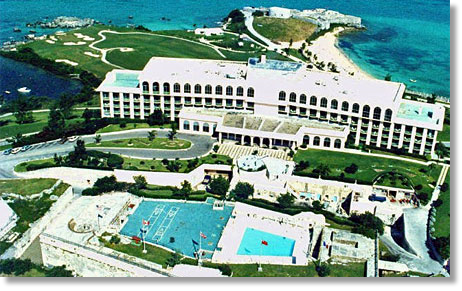
The task was a half-team jolly to various US locations including Nellis, Kirtland AFB (my foot got stuck in the roller side guidance - very embarrassing!), McGhee-Tyson (Knoxville) and home via Bermuda NAS. The team was Nige Robinson, Kev (Sully) Sullivan and myself.
The hotel in Bermuda was the rather luxurious Lowes Bermuda Beach in St George's parish and reasonably close to the airport. The hotel had a dress code and much to the amusement of Nige and Kev, their team leader had not packed a jacket. Pizza on the beach for me and luxury restaurant dinner for the other two. As a footnote, the LBB hotel later became Club Med and then was abandoned.
Kim and I visited a few years ago and it was spooky to be able to walk around the grounds, dry swimming pools, deserted verandas and, peaking through the main doors, a reception area caught in another time still had pens on all the desks.
The hotel in Bermuda was the rather luxurious Lowes Bermuda Beach in St George's parish and reasonably close to the airport. The hotel had a dress code and much to the amusement of Nige and Kev, their team leader had not packed a jacket. Pizza on the beach for me and luxury restaurant dinner for the other two. As a footnote, the LBB hotel later became Club Med and then was abandoned.
Kim and I visited a few years ago and it was spooky to be able to walk around the grounds, dry swimming pools, deserted verandas and, peaking through the main doors, a reception area caught in another time still had pens on all the desks.
Second up is a story from days in Dulles. I was route following a Royal through multiple stops in the US. We came to Houston and the extremely grand Lincoln Hotel where the royal party was also staying. Deciding to go to a nearby gym, I ran back to the hotel in grungy sports kit. Not noticing the black-suited men talking to their wrists as I barged through the main entrance of the hotel, I was temporarily blind from moving from bright sunlight to the dark lobby. Next thing I knew I tripped on the carpet and was spread eagle in the taped-off area that was prepared for the soon to arrive Royal party. Deeply embarrassed and struggling to my feet, a voice from the crowd said, “Way to go Air Force!” – John Knapp the VC10 Royal captain!
Keep up the good work!
Jerry
Keep up the good work!
Jerry

From: Gerry Davis, Bedminster, Somerset
Subject: Hotel Stories
I did my stint of 3 years on NEAF MAMS between 1965-68 whilst based at Akrotiri, Nicosia and then back to Akrotiri. During this yoyoing, which was an accompanied tour, our two teams were blessed with many detachments, some of which we were billeted in hotels. I use the word hotel sparingly as most of them were crap. Our detachments were all in far-off unforgiving places that tourists would not be seen dead in.
Subject: Hotel Stories
I did my stint of 3 years on NEAF MAMS between 1965-68 whilst based at Akrotiri, Nicosia and then back to Akrotiri. During this yoyoing, which was an accompanied tour, our two teams were blessed with many detachments, some of which we were billeted in hotels. I use the word hotel sparingly as most of them were crap. Our detachments were all in far-off unforgiving places that tourists would not be seen dead in.

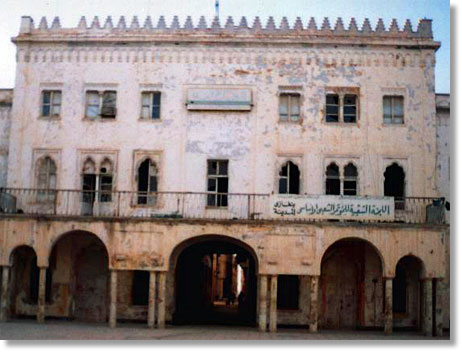
Benghazi was a frequent stopping point on our list of exotic locations. The hotel fostered upon us was run by a Greek gent who often visited our room, shared by three of us to one bed. We thought that each visit by him was to join our festivities, but no, he wanted us to keep the noise down whilst we consumed the Cypriot vino, which we had fortuitously brought with us whilst we sang questionable rugby songs.
The water in this establishment was turned off during the day, which made a bit of a pong as the flushing loo was not working. Then one time there was a tremendous storm during which the room got flooded, that was because the balcony doors (which overlooked a ginormous wall 5 feet away blocking out any kind of view) would not close.
So, during the storm with all the banging and flashing, I took it upon myself to pull closed the sodden curtains. The wooden curtain rail which was possibly made of a 2 x 4 and all of 8 feet long, came off the wall and knocked me out cold. There I lay in filthy water for the rest of the night while my drunken oppo's snored away. We didn't eat in this place as the menu was indescribable and we pestered our OC to eat in the hotel in which he was staying.
The water in this establishment was turned off during the day, which made a bit of a pong as the flushing loo was not working. Then one time there was a tremendous storm during which the room got flooded, that was because the balcony doors (which overlooked a ginormous wall 5 feet away blocking out any kind of view) would not close.
So, during the storm with all the banging and flashing, I took it upon myself to pull closed the sodden curtains. The wooden curtain rail which was possibly made of a 2 x 4 and all of 8 feet long, came off the wall and knocked me out cold. There I lay in filthy water for the rest of the night while my drunken oppo's snored away. We didn't eat in this place as the menu was indescribable and we pestered our OC to eat in the hotel in which he was staying.
Just about every other hotel in our travels in Turkey, Iran, Beirut and not forgetting the two 3-month detachments in Nairobi during the oil lift, when we stayed in the Spread Eagle Hotel, were bad. Now there is a shed load of stories to be told of that place, for possibly another time.
But hey, I missed out all the ‘Glamping’ that we did in the Libyan desert.
Gerry
But hey, I missed out all the ‘Glamping’ that we did in the Libyan desert.
Gerry

From: Andy Gell, Truro, Cornwall
Subject: Hotel Stories
Hi Tony,
A couple of hotel stories from mobile days in the 80's pop to mind. Firstly, an arrival on a VC10 in Barbados shortly after a hurricane had impacted the island. I can’t remember the purpose of the trip, but I seem to think that we had started with a drop off or pick up in Dulles and then a similar serial in New Orleans, before the Barbados leg.
Subject: Hotel Stories
Hi Tony,
A couple of hotel stories from mobile days in the 80's pop to mind. Firstly, an arrival on a VC10 in Barbados shortly after a hurricane had impacted the island. I can’t remember the purpose of the trip, but I seem to think that we had started with a drop off or pick up in Dulles and then a similar serial in New Orleans, before the Barbados leg.

On landing we were met by a rep from the High Commission who informed us that, due to the impact of the hurricane, he had only been able to secure five hotel rooms. Before you could say ‘knife’, the VC10 captain shouted out that he would need those rooms for the operating crew as they required unbroken sleep and that the MAMS officer (me) would have to sort out the ‘problem’. Upon which he turned about and, shepherding his colleagues before him, disappeared into a taxi.
At this point I realised that the ‘problem’ was my team, the two RAFP supernumerary crew, the GE and a couple of passengers. The High Commission guy decided that the situation fell into the ‘too difficult’ category and announced that he had to go, thrust a copy of the local phone book into my hand and pointed to the phone before making himself scarce. All this was, of course, years before the internet, PCs, mobile phones or tablets that now make finding and booking hotels so easy. I worked my way through that phonebook without success and can honestly say that I had tried every other hotel on the island before approaching the only one left: the Barbados Hilton, at that time probably the premier hotel in Barbados. They had no rooms, but they did have a number of suites, at what in the 80's was a king’s ransom of $480 a night per suite. The Amex took care of it, but, as I lay in the jacuzzi in my suite that evening, I did ponder for a while on how I was going to get this past the long-suffering corporal in SHQ at Lyneham who administered the sub-imprest accounts.
Sweetest of all was the reaction of the operating crew who had behaved so shabbily on arrival. Their hotel it seemed had not been very good and the five rooms had turned out to be three, necessitating some sharing. We took delight in explaining how it had worked out for us.
Sweetest of all was the reaction of the operating crew who had behaved so shabbily on arrival. Their hotel it seemed had not been very good and the five rooms had turned out to be three, necessitating some sharing. We took delight in explaining how it had worked out for us.
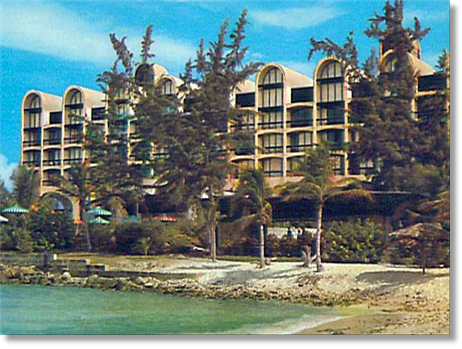
The second memory takes us to Dakar, Senegal, probably an overnight stop on the way to Ascension. The MAMS part-team met in the hotel bar for a few drinks. The bar was populated by what in those days were colloquially known as the ‘night fighters’. The deal was that anyone who chatted to them had to pay for their drinks. Most of us were wise enough to avoid their company, but one SAC was not. We had an early start the next day and I turned in at a reasonable hour.
At about two in the morning, I was awoken by hammering on my room door. I opening it to find the bar manager, wearing a red fez and caftan, who explained in haltering, but heated, English that the SAC had done a runner without paying for the night fighters’ drinks. The sum involved was not a lot and I paid the manager off before going in search of the SAC. When I got to his room, the door was open, the SAC was missing, as was all of his luggage. Unsure what to do about it at that time of night, I decided to set the alarm for first light and to try to get a bit more sleep until then. A few hours later I was up and started the search back at his room to see whether there were any clues as to his whereabouts. Imagine my surprise when I got to his, still open, room to find him, stark naked and covered in mud, lying on his bed. I guess that I was a little grumpy as I propelled him to the shower, where I can clearly recall his pink body emerged as the water washed the mud away.
Having had quite a few sherberts, his recollections were hazy and his explanation ran along the lines of having fled from the demands for money in the bar, hastily gathering his belongings and running out into the bondu, at which stage his memory faded. He had no idea where his clothes might now be and, perhaps not surprisingly, a cursory search outside the hotel found nothing. We got him to the aircraft wearing a borrowed flying suit and flip flops, and hoping that his now lost passport would not be required down route. I have no clear recollection of what happened after that, which suggests that there were no further dramas and that he got away with it.
Andy Gell
At about two in the morning, I was awoken by hammering on my room door. I opening it to find the bar manager, wearing a red fez and caftan, who explained in haltering, but heated, English that the SAC had done a runner without paying for the night fighters’ drinks. The sum involved was not a lot and I paid the manager off before going in search of the SAC. When I got to his room, the door was open, the SAC was missing, as was all of his luggage. Unsure what to do about it at that time of night, I decided to set the alarm for first light and to try to get a bit more sleep until then. A few hours later I was up and started the search back at his room to see whether there were any clues as to his whereabouts. Imagine my surprise when I got to his, still open, room to find him, stark naked and covered in mud, lying on his bed. I guess that I was a little grumpy as I propelled him to the shower, where I can clearly recall his pink body emerged as the water washed the mud away.
Having had quite a few sherberts, his recollections were hazy and his explanation ran along the lines of having fled from the demands for money in the bar, hastily gathering his belongings and running out into the bondu, at which stage his memory faded. He had no idea where his clothes might now be and, perhaps not surprisingly, a cursory search outside the hotel found nothing. We got him to the aircraft wearing a borrowed flying suit and flip flops, and hoping that his now lost passport would not be required down route. I have no clear recollection of what happened after that, which suggests that there were no further dramas and that he got away with it.
Andy Gell

From: Alex McGrath, Sunderland
Subject: Hotel Stories
Hi Tony,
This might be a bit too saucy for the magazine, but just a typical MAMS detatchment from my perspective. So, back in 2011, I took a team of five to Nairobi for one of the troop/helicopter roulements over a ten day period and, as we often did back then, we stayed at the Panari Hotel on the outer rims of the city overlooking the plains of Kenya.
Subject: Hotel Stories
Hi Tony,
This might be a bit too saucy for the magazine, but just a typical MAMS detatchment from my perspective. So, back in 2011, I took a team of five to Nairobi for one of the troop/helicopter roulements over a ten day period and, as we often did back then, we stayed at the Panari Hotel on the outer rims of the city overlooking the plains of Kenya.
A Cpl and SAC were tasked to act as pax co-ordinators, helping Swissport and the RAFLO with the unit moves which were being flown in/out on chartered Monarch flights. Myself and the other three lads were primarily tasked to look after the various cargo moves that were aligned with the exercise.
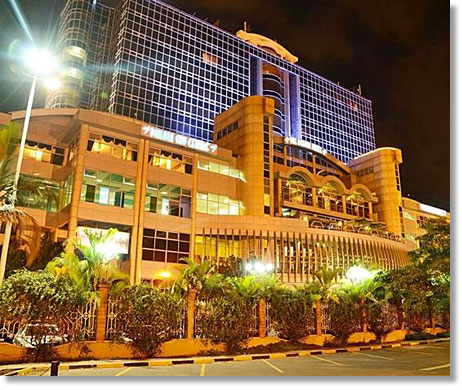
On the second day, after a hard days graft in the cargo area, I was first down to the bar. Chatting the usual pleasantries with the barman whilst puffing on a cigarette, a well dressed gentleman arrived and joined me a couple of seats along the bar.
The inevitable discussion struck up and it soon became known that the gentleman was the aircraft captain of the Monarch flight which had arrived with the first load of troops. Once he was told who I was and how we were linked he then gleefully informed me that he had previously been a Tristar pilot on 216 Sqn.
After a few laughs of banter, I told him that the smoking part of the bar was to our left and the right side was non-smoking and as most of my team were smokers we generally sat over there and you are all more than welcome to join us, especially the lovely ladies who I knew would be a part of his team. He replied with a sarcastic “Oh no, I think me and my girls will sit over in the non-smoking area, they won’t be joining you and your boys tonight.” Fair enough I said, and as my lads began to appear, I said, "All the best, catch you later," and we moved to our regular couches to enjoy a drink before dinner.
The lads were obviously eyeing up the stewardesses as they began to arrive for dinner and the smooth talking planning began to take shape. I told the lads who the captain said he was and the challenge that he had laid down.
The inevitable discussion struck up and it soon became known that the gentleman was the aircraft captain of the Monarch flight which had arrived with the first load of troops. Once he was told who I was and how we were linked he then gleefully informed me that he had previously been a Tristar pilot on 216 Sqn.
After a few laughs of banter, I told him that the smoking part of the bar was to our left and the right side was non-smoking and as most of my team were smokers we generally sat over there and you are all more than welcome to join us, especially the lovely ladies who I knew would be a part of his team. He replied with a sarcastic “Oh no, I think me and my girls will sit over in the non-smoking area, they won’t be joining you and your boys tonight.” Fair enough I said, and as my lads began to appear, I said, "All the best, catch you later," and we moved to our regular couches to enjoy a drink before dinner.
The lads were obviously eyeing up the stewardesses as they began to arrive for dinner and the smooth talking planning began to take shape. I told the lads who the captain said he was and the challenge that he had laid down.
An hour or so later we were sitting in the smoking section, and the Monarch crew were happily sitting across the bar in the non-smoking section. Inevitably, three of the girls were smokers and kept coming over to have a puff and as the lads began to put their smooth talking moves into action it wasn’t long before all the girls were sitting around chatting to the team with the two male pilots sitting alone in the non-smoking area.
As I casually turned around and looked over, the ex-Tristar captain was glaring across towards me, I gently raised my glass gave him a cheeky wink and ushered him across to join us. He walked over, chinged my glass and joined in the frivolity and for the next two days... well we won't go any further than that, but there will be plenty out there who can imagine what happened next.
Needless to say, the promise of love forever soon evaporated as different Monarch Luton and Manchester crews continually transited through over the next 10 days, much to the dismay of breaking hearts back in the UK.
Cheers!
Al McGrath
As I casually turned around and looked over, the ex-Tristar captain was glaring across towards me, I gently raised my glass gave him a cheeky wink and ushered him across to join us. He walked over, chinged my glass and joined in the frivolity and for the next two days... well we won't go any further than that, but there will be plenty out there who can imagine what happened next.
Needless to say, the promise of love forever soon evaporated as different Monarch Luton and Manchester crews continually transited through over the next 10 days, much to the dismay of breaking hearts back in the UK.
Cheers!
Al McGrath


From: Ian Place, Meanwood, West Yorks
Subject: Hotel Stories
Tony, one of my recollections was in early March, 1973, a 3-man team (names witheld), we arrived at CFB Winnipeg to pick up an Army comms unit and return to Lyneham via Gander. When we got to Winnipeg, we were told we were staying on base. Our Loadmaster kicked off as he wanted to stay downtown. What made it worse was that they wanted us to load the aircraft before we departed the following morning. We subsequently spent a very entertaining evening in the Corporal's Club. We tried to pay for our drinks, but the generous lads behind the bar and in the club told us our money was no good there!
Subject: Hotel Stories
Tony, one of my recollections was in early March, 1973, a 3-man team (names witheld), we arrived at CFB Winnipeg to pick up an Army comms unit and return to Lyneham via Gander. When we got to Winnipeg, we were told we were staying on base. Our Loadmaster kicked off as he wanted to stay downtown. What made it worse was that they wanted us to load the aircraft before we departed the following morning. We subsequently spent a very entertaining evening in the Corporal's Club. We tried to pay for our drinks, but the generous lads behind the bar and in the club told us our money was no good there!
The next morning, feeling the worst for wear and very blurry eyed, we loaded the C130. The loadmaster who had previously had an argument about the accommodations went sick and we all ended up for a non-scheduled night in the Winnipeg Inn downtown! Sometimes the squeeky wheel gets the oil but with no personal benefit!
Ian
Ian


From: Jacques Leclerc, St-Alexandre de Kamouraska, QC
Subject: Hotel Stories
Hello Tony,
During the ice storm in Montreal in 1998, I was working out of Mirabel taking care of all the aircraft coming in with generators and supplies.
Subject: Hotel Stories
Hello Tony,
During the ice storm in Montreal in 1998, I was working out of Mirabel taking care of all the aircraft coming in with generators and supplies.
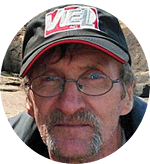
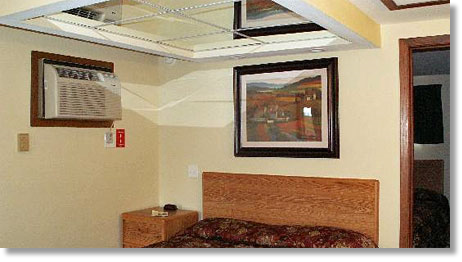
The traffic was way too bad to go back to Longue Pointe (Military base for 4 CFMCU) that I decided to stay in Mirabel, so I told my Mcpl to find us accomodation for 4 nights close by the airport. All hotels were booked solid but he found a Motel, asked me if this was fine, and I told him that as long as it has a bed it is fine with me.
After a long day we went to the motel and as I walked into my room I was shocked to see a full size bed with a coin-operated machine that makes the bed vibrate and a ceiling covered with mirrors. Remember this was in 1998 not back in the 70's when it was more common.
Take good care Tony.
Jacques
After a long day we went to the motel and as I walked into my room I was shocked to see a full size bed with a coin-operated machine that makes the bed vibrate and a ceiling covered with mirrors. Remember this was in 1998 not back in the 70's when it was more common.
Take good care Tony.
Jacques

From: George Graves, Carlisle, Cumbria
Subject: Hotel Stories
Hi Tony,
Like yourself, I too spent a night in Darwin. It was November 1968 and we were on our way to Woomera. I think the hotel was just called simply, The Darwin.
Subject: Hotel Stories
Hi Tony,
Like yourself, I too spent a night in Darwin. It was November 1968 and we were on our way to Woomera. I think the hotel was just called simply, The Darwin.
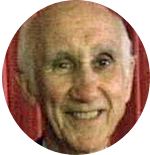
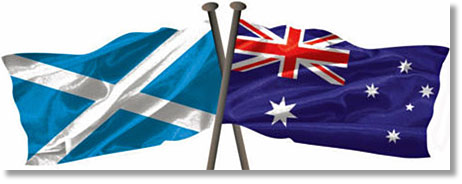
After dinner we retired to the beer garden. In one area there was a large group of people having an enjoyable time and singing, mainly Scottish songs. We learnt that they were families from Scotland that had emigrated several years previous. They met at the hotel on the 30th November (St Andrews day) every year for a reunion. We joined them and had a really good night.
Cheers
George
Cheers
George

From: Graham Allen, Nottingham, Notts
Subject: Hotel Stories
Hi Tony,
This happened whilst I was working for Antonov. We had just unloaded 3 helicopters and boxes of spares. All the technicians had done their jobs and went of on a tour of Lima and surrounding area.
Subject: Hotel Stories
Hi Tony,
This happened whilst I was working for Antonov. We had just unloaded 3 helicopters and boxes of spares. All the technicians had done their jobs and went of on a tour of Lima and surrounding area.

Myself and the loadie went back to the Sheraton to collect the money to pay for the handling and ops fees. Collected money from the safe (in excess of $100,000). Paid the agent and ops, had a coffee with them and returned to the hotel. Loadie knocked on my door and asked me if I could go with him as he wanted to get his wife a gift.
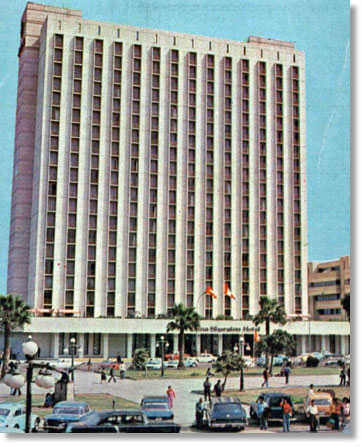
The Sheraton was very nice, no complaints, but it was not in the best part of town. The market was just a short walk and we had got about 10 yards away from front of the hotel when we were attacked from behind! I had my wallet pinched plus my watch. I only lost £20 plus $20, the watch was worth about £150. The whack left me needing 6 stitches to the back of my head. The loadie had just turned his head and got caught with a knife, needing 10 stitches; he lost over $100. We reported it to the police and they only wanted paying for their report and said it was unlikely that they would catch anybody. They wanted $60 for the report, told them I only had $10 as we had been robbed! That will do he said! He said to wait in the office, he comes back ten minutes later and said he had got somebody for robbing us. We were surprised but he said he would bring the report to the hotel and we were escorted out of the police station. We had to wait as somebody else was being brought in wearing handcuffs! We looked into the room and this guy had been beaten into saying he had robbed us. The copper said that’s who beat you up! I think he just happened to be walking past the cop shop and got dragged in and charged.
We reported back to Kiev and they asked if we were ok to carry on. We said yes, we just had king size headaches. We were lucky considering how much money we had on us just an hour previously. Myself and the loadie had a couple of days off as our next job was delayed, we were walking out the front door of the hotel and the guy who had been charged for the robbery was walking past. He came over to us and said something and I got the doorman to translate for us. It was as I thought, the poor sod just happened to walk past the police station on his way to work. The police let him off with a warning not to do it again! I have no wish to return to Lima anytime soon!
All the best, Graham
We reported back to Kiev and they asked if we were ok to carry on. We said yes, we just had king size headaches. We were lucky considering how much money we had on us just an hour previously. Myself and the loadie had a couple of days off as our next job was delayed, we were walking out the front door of the hotel and the guy who had been charged for the robbery was walking past. He came over to us and said something and I got the doorman to translate for us. It was as I thought, the poor sod just happened to walk past the police station on his way to work. The police let him off with a warning not to do it again! I have no wish to return to Lima anytime soon!
All the best, Graham

From: Mick Craner, Yeovil, Somerset
Subject: Hotel Stories
G'day Tony,
I have a number of Hotel stories, although many I think should be kept in the memory bank! But, here is one that I think will be of interest.
Subject: Hotel Stories
G'day Tony,
I have a number of Hotel stories, although many I think should be kept in the memory bank! But, here is one that I think will be of interest.
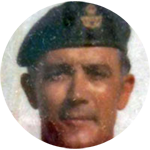
On a trip with a 48 Squadron Hastings to Bangkok in 1966, the purpose of the visit escapes me, but I remember a good time was had. We had made arrangements with the hotel manager to have less from the menu and free attendance at the bar.
The first evening we decided to see the sights in town. One of our crew members decided to stay at the hotel to pursue other interests.
On our return to the hotel we found our friend in the bar as drunk as a lord. When asked how he managed to get so high, he replied, "I have drunk half of your breakfasts!"
Take care, Mick
The first evening we decided to see the sights in town. One of our crew members decided to stay at the hotel to pursue other interests.
On our return to the hotel we found our friend in the bar as drunk as a lord. When asked how he managed to get so high, he replied, "I have drunk half of your breakfasts!"
Take care, Mick
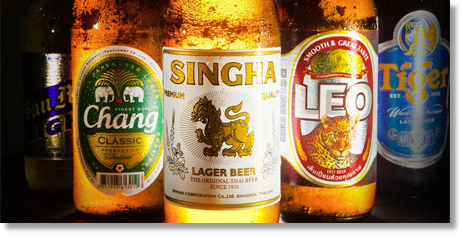

From: Vern Mike Lefebvre, Burton, NB
Subject: Hotel Stories
This story is from my time spent on a trip to Biafra on a UN relief mission. We departed Trenton, Ontario, in early June 1968 in a rush after a visit to the clothing store and got vaccinated. We spent the first night in Barbados, and our next stop was Recife, Brazil.
Subject: Hotel Stories
This story is from my time spent on a trip to Biafra on a UN relief mission. We departed Trenton, Ontario, in early June 1968 in a rush after a visit to the clothing store and got vaccinated. We spent the first night in Barbados, and our next stop was Recife, Brazil.

We arrived at the waterfront hotel, a very modern and tall building. Unfortunately there was not enough room available for all of us. Just around the corner was a pension house (a type of boarding house) that was suggested to our team leader. The aircrew stayed at the hotel and the MAMS team continued to “Rita’s House”.
The property was surrounded by a tall wall and on entering there was a large screened meeting room with a bar, couches and chairs. This led to a passage to the dining room with guest rooms on each side - 4 walls with a door and open ceiling to the rafters with no windows then more rooms behind the dining room. The back yard had small houses like chicken coops for the middle-aged female staff.
So far it’s OK . But come morning and the news from the aircraft commander that we are unable to fly to our next stop at Ascension Island due to an Apollo mission in difficulty and having a re-entry zone at the equator. Just our luck. So, day by day, we waited for the aircraft commander to bring the news, either one way or the other.
The property was surrounded by a tall wall and on entering there was a large screened meeting room with a bar, couches and chairs. This led to a passage to the dining room with guest rooms on each side - 4 walls with a door and open ceiling to the rafters with no windows then more rooms behind the dining room. The back yard had small houses like chicken coops for the middle-aged female staff.
So far it’s OK . But come morning and the news from the aircraft commander that we are unable to fly to our next stop at Ascension Island due to an Apollo mission in difficulty and having a re-entry zone at the equator. Just our luck. So, day by day, we waited for the aircraft commander to bring the news, either one way or the other.

In the meantime, we enjoyed a great breakfast with 1/4 of a pineapple for starters followed by ham, eggs, freshly squeezed juices and dark coffee. You name it - it was there.
We spent the days on the beach, bodysurfing, drinking Bacardi in coconuts and eating steak sandwiches. The evenings were spent on terraces near the house on stilts where the bar on the fourth floor was everyone’s favourite - the stairway to the top was lined up with gorgeous women, hoping for an invite.
Day after day we waited, some went bowling, some to the Bacardi distillery tour. Days passed and we waited. At the house the bar was on an honour system, just put a mark in the book. For days we were kings.
Then came the news the airways were clear. We passed the hat around and called the staff to a meeting, presented them with our thank you for a great stay. It appears that we gave them more money than they normally made in a year.
We were invited to return some day - 50 plus years have passed and I still want to go back!
We spent the days on the beach, bodysurfing, drinking Bacardi in coconuts and eating steak sandwiches. The evenings were spent on terraces near the house on stilts where the bar on the fourth floor was everyone’s favourite - the stairway to the top was lined up with gorgeous women, hoping for an invite.
Day after day we waited, some went bowling, some to the Bacardi distillery tour. Days passed and we waited. At the house the bar was on an honour system, just put a mark in the book. For days we were kings.
Then came the news the airways were clear. We passed the hat around and called the staff to a meeting, presented them with our thank you for a great stay. It appears that we gave them more money than they normally made in a year.
We were invited to return some day - 50 plus years have passed and I still want to go back!

Last surviving Blackburn Beverley taken apart at Fort Paull
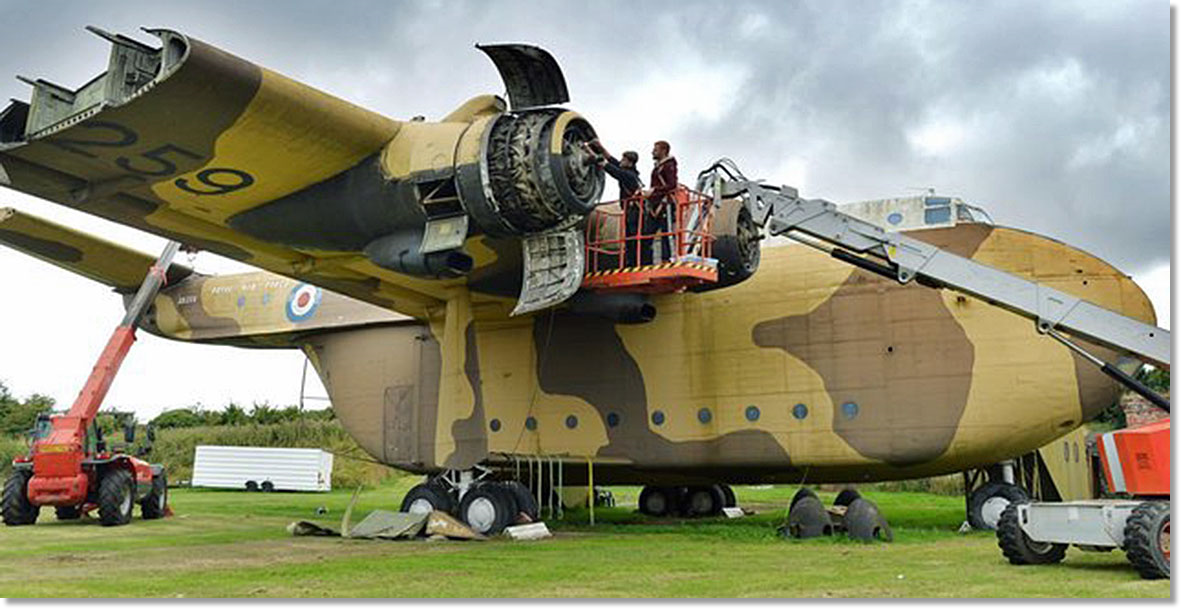
The last surviving Blackburn Beverley is being taken apart at Fort Paull before the move to a new home in East Yorkshire. It might not be looking its best in its partially dismantled state, but to owner Martyn Wiseman it is still gorgeous. The Herculean task of taking apart the world’s last surviving Blackburn Beverley XB259 is now in its fourth week, and there’s a still a long haul yet.
The huge transport plane, built at Brough, took to the air on January 29, 1955, and has been an exhibit for nearly two decades at Fort Paull, close to where it trundled to a halt after its last flight in 1974.
Mr Wiseman’s team can’t rush the job - every bolt is rusted solid after 17 years of exposure to the elements at the former military museum. Mr Wiseman, who runs Condor Aviation, bought the giant aircraft at auction last year saving it from scrap merchants, who stood to make £20,000 from its 35 tonnes of aluminium. It will be going to his airfield near Selby, Birchwood Lodge, once part of RAF Riccall, and he jokes that his wife is not keen: “She wanted a water feature so she gets a big aircraft instead.” There the plane, which has a hold which once held a bunch of wild onyx, rescued from floods in Kenya in the 1970s, will act as a conference centre for the universities which partner Condor on projects and also as a unique Airbnb.
Mr Wiseman, who has a civil engineering firm and also makes bespoke experimental designs for light aircraft, said the first week was spent figuring out what to do with a structure “so delicate, so close to falling apart”. He said: “The props are off, the wing tips are off, the engines are ready to lift off, the tail is dismantled. It is really ugly, but so ugly, it’s beautiful. “The long term idea is to have it up at Birchwood, to reassemble and rebuild it and completely equip it out. It has to be self financing or it will end up for scrap. There are no other options.” The team hopes to make the plane as energy-efficient as possible - by converting the propellors to mini-wind turbines to generate electricity.
The huge transport plane, built at Brough, took to the air on January 29, 1955, and has been an exhibit for nearly two decades at Fort Paull, close to where it trundled to a halt after its last flight in 1974.
Mr Wiseman’s team can’t rush the job - every bolt is rusted solid after 17 years of exposure to the elements at the former military museum. Mr Wiseman, who runs Condor Aviation, bought the giant aircraft at auction last year saving it from scrap merchants, who stood to make £20,000 from its 35 tonnes of aluminium. It will be going to his airfield near Selby, Birchwood Lodge, once part of RAF Riccall, and he jokes that his wife is not keen: “She wanted a water feature so she gets a big aircraft instead.” There the plane, which has a hold which once held a bunch of wild onyx, rescued from floods in Kenya in the 1970s, will act as a conference centre for the universities which partner Condor on projects and also as a unique Airbnb.
Mr Wiseman, who has a civil engineering firm and also makes bespoke experimental designs for light aircraft, said the first week was spent figuring out what to do with a structure “so delicate, so close to falling apart”. He said: “The props are off, the wing tips are off, the engines are ready to lift off, the tail is dismantled. It is really ugly, but so ugly, it’s beautiful. “The long term idea is to have it up at Birchwood, to reassemble and rebuild it and completely equip it out. It has to be self financing or it will end up for scrap. There are no other options.” The team hopes to make the plane as energy-efficient as possible - by converting the propellors to mini-wind turbines to generate electricity.
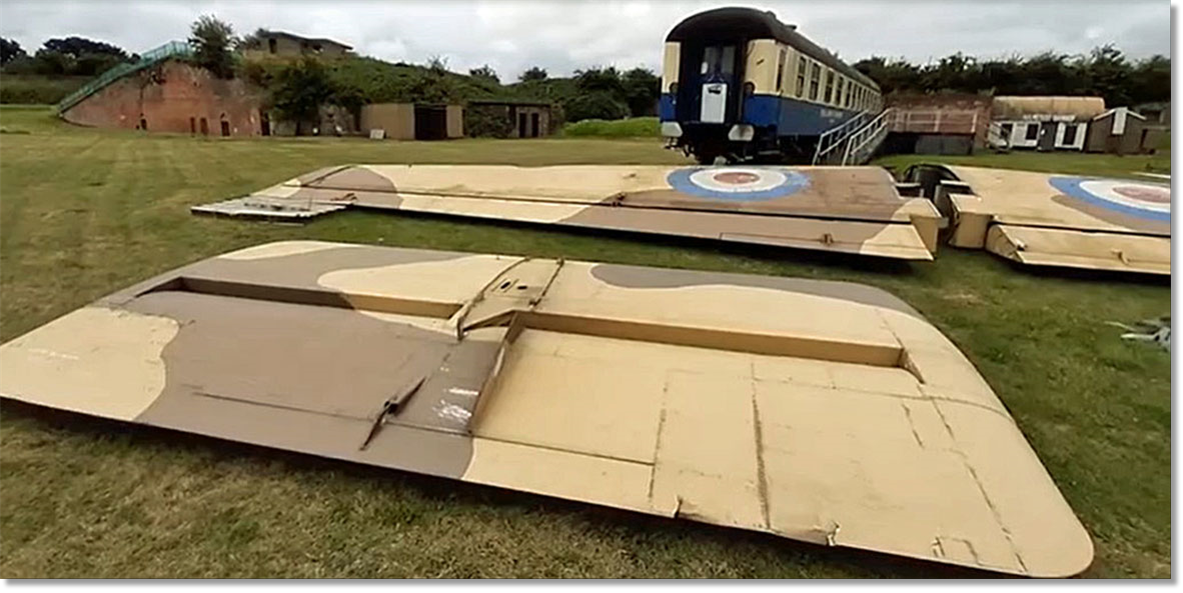
The plane - which will have two bedrooms in the bay where paratroopers used to jump from - will need much better insulation to keep it warm and useable throughout the winter. The cockpit will be preserved, with the pilot and co-pilot’s seats reupholstered and put on swivels, and the navigator’s and engineer’s stations removed to create space for a lounge. Mr Wiseman said he hasn’t a clue of the cost, adding: “If I did I wouldn’t dare add it up.” He said without the help of philanthropist Georg Von der Muehll, a Swiss banker - both chipped in £28,000 each at the start - “this would not have happened”. He added: “In terms of any regrets I have none at all - she is a fabulous old thing.” The mammoth task has seen him invest in £80,000 of equipment, to assist his team, chief foreman Wayne Ali, junior engineer Conner Petty and aerospace graduate Oliver Melville, who are having to squeeze into the wings to take them apart.
Aviation restorer Paul Flynn said many years ago he saw a Blackburn Beverley being bulldozed at RAF Hendon. He said: “These things suck money out of you like there’s no tomorrow. "It’s a brave but inspiring move. Martyn got a lot of criticism online but at the end of the day he is saving the aircraft, which would have gone to scrap.”
Founder of veterans charity Hull 4 Heroes Paul Matson was also at Fort Paull and said he hopes ex-service personnel with RAF backgrounds will get involved in the project. He grew up in the village and the fort was his “den”. He said: “I’m sure many of the veterans would love to be involved in something like this - it is taking something to bits and then putting it together again.”
Yorkshire Post
Aviation restorer Paul Flynn said many years ago he saw a Blackburn Beverley being bulldozed at RAF Hendon. He said: “These things suck money out of you like there’s no tomorrow. "It’s a brave but inspiring move. Martyn got a lot of criticism online but at the end of the day he is saving the aircraft, which would have gone to scrap.”
Founder of veterans charity Hull 4 Heroes Paul Matson was also at Fort Paull and said he hopes ex-service personnel with RAF backgrounds will get involved in the project. He grew up in the village and the fort was his “den”. He said: “I’m sure many of the veterans would love to be involved in something like this - it is taking something to bits and then putting it together again.”
Yorkshire Post

From: David Bernard, Bicester, Oxon
Subject: Save the Original Spitfire Shed
Hello Tony and Fellow Movers,
Subject: Save the Original Spitfire Shed
Hello Tony and Fellow Movers,
Save the Original Spitfire Shed!
I’ve just signed the petition "Southampton City Council: Save the original Spitfire Flight Shed from demolition - @SouthamptonCC" and wondered whether you could help by adding your name.
Our goal is to reach 50,000 signatures and we need more support. You can read more and sign the petition here:
https://chng.it/PhxLSbx5Dq
Thanks!
Dave
Our goal is to reach 50,000 signatures and we need more support. You can read more and sign the petition here:
https://chng.it/PhxLSbx5Dq
Thanks!
Dave
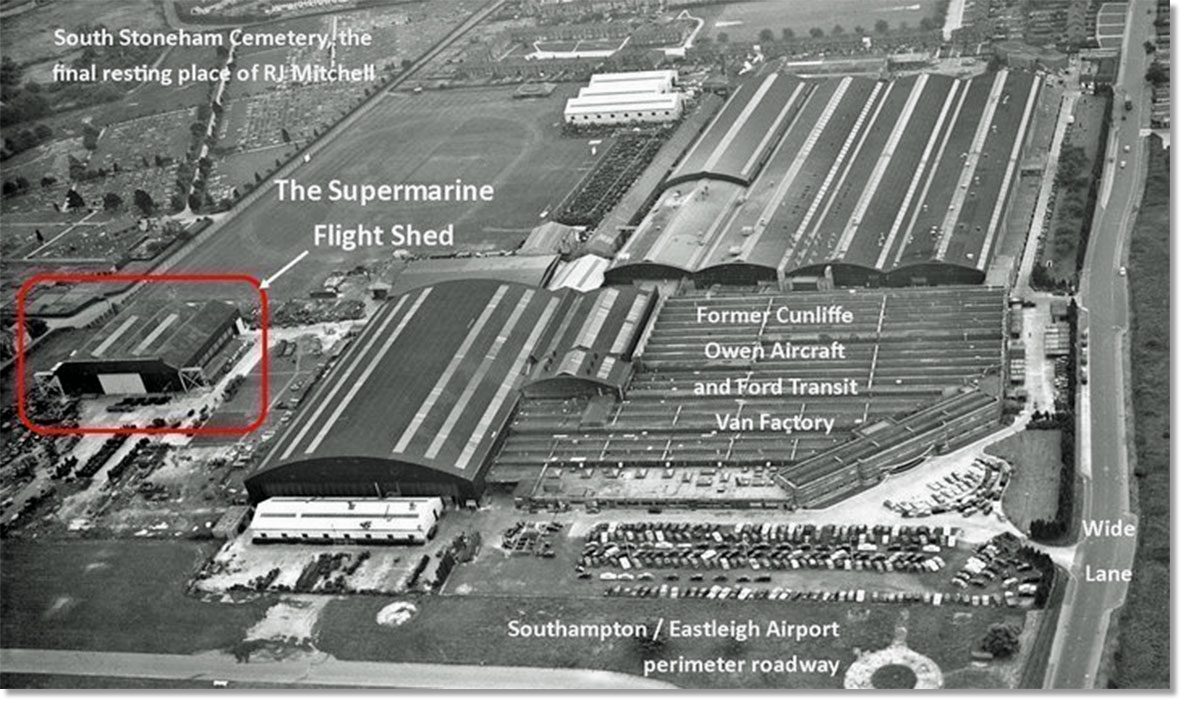


Group Captain David C Bernard MBE FRAeS
Chairman, RAeS Oxford Branch
Chairman, RAeS Oxford Branch

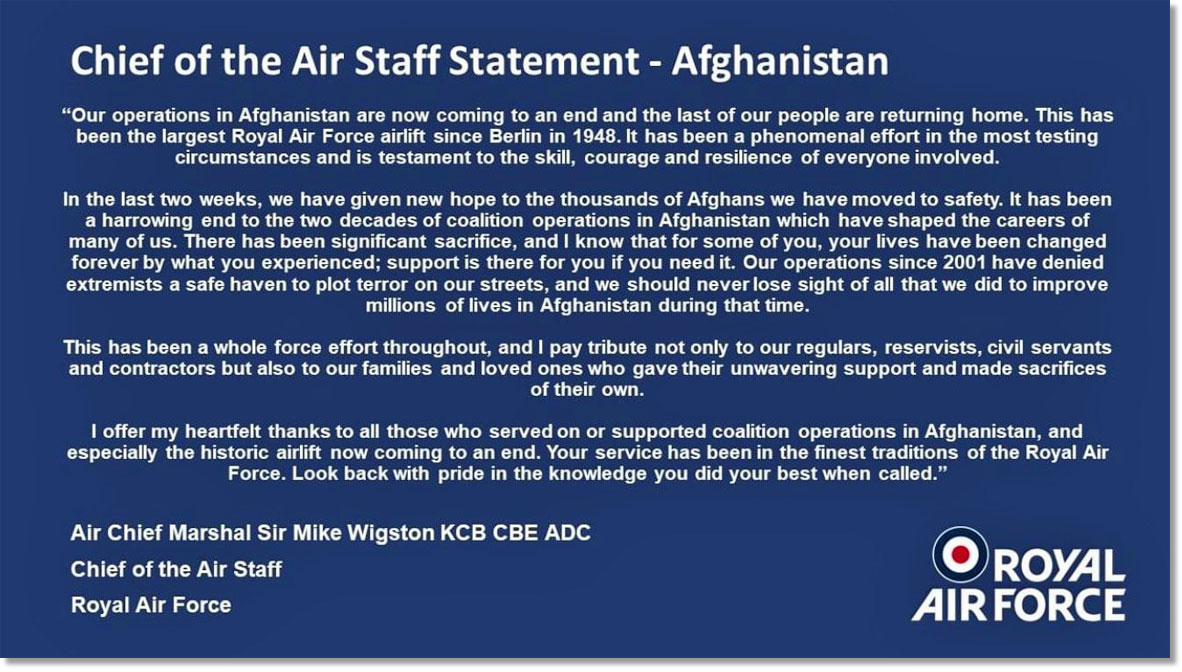

From: Dave Green, Huntingdon, Cambs
Subject: Hotel Stories
Hi Tony,
As you are definitely aware, movers don't mind appropriating the odd thing to make crew rooms look more attractive. I spent 6 months as OC Movs and Stockholding in Belize in 1983, with Brian Connellan as my Flt Sgt for the first 3 months before Jim Brett took over from him.
Subject: Hotel Stories
Hi Tony,
As you are definitely aware, movers don't mind appropriating the odd thing to make crew rooms look more attractive. I spent 6 months as OC Movs and Stockholding in Belize in 1983, with Brian Connellan as my Flt Sgt for the first 3 months before Jim Brett took over from him.
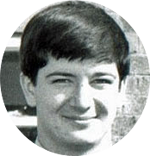
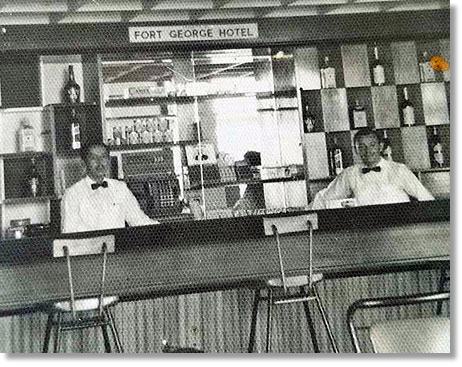
I remember one evening we were all downtown in Belize City in the Fort George (the only decent hotel in the city at the time) for a few beers. At the end of the evening somebody suggested that the large onyx statue in the hotel reception would look great in the tea bar!
(I'm sure OC Supply, John Bell, would probably have disagreed at this point).
Due to the quantity of beer consumed and the almighty strength of my team (Mick Solis, Chris Carlin etc), Brian and the boys set to moving the statue whilst I had the job of distracting the pleasant young lady on reception.
Suffice to say, the noise being made trying to move a couple of tons of Onyx didn't help with my distraction process and I think the receptionist was truly amazed that the guys actually moved it about 2 inches! Luckily she was content to let the matter rest if we moved it back which the guys just about managed!
I'm guessing the statue is still in the Fort George complete with the 2 inch scrape mark on the floor!
Regards, Dave Green
(I'm sure OC Supply, John Bell, would probably have disagreed at this point).
Due to the quantity of beer consumed and the almighty strength of my team (Mick Solis, Chris Carlin etc), Brian and the boys set to moving the statue whilst I had the job of distracting the pleasant young lady on reception.
Suffice to say, the noise being made trying to move a couple of tons of Onyx didn't help with my distraction process and I think the receptionist was truly amazed that the guys actually moved it about 2 inches! Luckily she was content to let the matter rest if we moved it back which the guys just about managed!
I'm guessing the statue is still in the Fort George complete with the 2 inch scrape mark on the floor!
Regards, Dave Green
This trip made up for all of the cold days spent in Thule, Greenland, for 6 years in a row on Easter weekends while on Operation Box Top resupply missions.
Thank you Tony for your great work.
Vern Mike Lefebvre
Thank you Tony for your great work.
Vern Mike Lefebvre

C-17A Globemaster III Airdropped Critical Supplies to Antarctica.
Australian Antarctic Division General Manager Operations and Safety Charlton Clark said the mammoth operation was required after thick sea ice prevented a full resupply at the station last summer. “This aerial delivery of 23 loads of essential cargo, weighing more than nine and a half thousand kilograms will now support the station until our next resupply mission,” Mr Clark said. It truly was an amazing undertaking, involving considerable challenges with both weather and logistics and I’m thrilled it’s been a success.”
The mission involved teams of ADF and AAD people across four states including Queensland, New South Wales, Tasmania and Western Australia. Australian Defence Force (ADF) personnel spent a week carefully constructing the loads at the AAD biosecurity centre in Hobart, before it was delivered to the flight crew, arriving in Tasmania from RAAF Amberley in Queensland.
The flight then departed Perth International Airport early Thursday morning on a 15-hour round trip, travelling five thousand kilometres over the Southern Ocean before reaching the drop zone. The C-17A Globemaster III was supported by a KC-30A Multi-Role Tanker Transport aircraft which provided air-to-air fuelling to enable to return journey. “The real success in this mission is seeing vital equipment and medical supplies delivered to where it needs to be,” Mr Clark said. There was also mail, fresh food and gifts from loved ones in Australia, it really was like Christmas arriving in August for Mawson.”
Expeditioners recovered the cargo and parachutes off the ice in low light, strong winds as well as challenging minus -25 degree temperatures. Mawson research Station Leader Jason Ahrens said efforts were made to ensure the airdrop caused minimal disruption to wildlife. “We had expeditioners acting as spotters to make sure rogue penguins and seals didn’t unknowingly cross into the drop zone,” Mr Ahrens said. “The Mawson team are really excited to receive these much needed supplies and a little slice of home.”
More than three months of planning went into the mission, with both ADF and AAD personnel abiding by COVID-19 protocols. To mitigate the risk of COVID-19 transmission, ADF personnel arriving in Tasmania were required to spend two weeks in isolation and provide a negative COVID-19 test, and the cargo was sanitised. Strict biosecurity measures were also followed, with the parachutes washed to prevent unwanted foreign material entering the frozen continent.
The Commander Australian Contingent Operation SOUTHERN DISCOVERY, Wing Commander Dion Wright said that this airdrop demonstrated the enduring partnership between the two organisations. “For the ADF, Operation Southern Discovery is a really important part of the logistical puzzle in Antarctica, and provides essential support to the Australian Antarctic Program,” Wing Commander Wright said.
Minister for the Environment, Sussan Ley, praised the efforts of both organisations.
The mission involved teams of ADF and AAD people across four states including Queensland, New South Wales, Tasmania and Western Australia. Australian Defence Force (ADF) personnel spent a week carefully constructing the loads at the AAD biosecurity centre in Hobart, before it was delivered to the flight crew, arriving in Tasmania from RAAF Amberley in Queensland.
The flight then departed Perth International Airport early Thursday morning on a 15-hour round trip, travelling five thousand kilometres over the Southern Ocean before reaching the drop zone. The C-17A Globemaster III was supported by a KC-30A Multi-Role Tanker Transport aircraft which provided air-to-air fuelling to enable to return journey. “The real success in this mission is seeing vital equipment and medical supplies delivered to where it needs to be,” Mr Clark said. There was also mail, fresh food and gifts from loved ones in Australia, it really was like Christmas arriving in August for Mawson.”
Expeditioners recovered the cargo and parachutes off the ice in low light, strong winds as well as challenging minus -25 degree temperatures. Mawson research Station Leader Jason Ahrens said efforts were made to ensure the airdrop caused minimal disruption to wildlife. “We had expeditioners acting as spotters to make sure rogue penguins and seals didn’t unknowingly cross into the drop zone,” Mr Ahrens said. “The Mawson team are really excited to receive these much needed supplies and a little slice of home.”
More than three months of planning went into the mission, with both ADF and AAD personnel abiding by COVID-19 protocols. To mitigate the risk of COVID-19 transmission, ADF personnel arriving in Tasmania were required to spend two weeks in isolation and provide a negative COVID-19 test, and the cargo was sanitised. Strict biosecurity measures were also followed, with the parachutes washed to prevent unwanted foreign material entering the frozen continent.
The Commander Australian Contingent Operation SOUTHERN DISCOVERY, Wing Commander Dion Wright said that this airdrop demonstrated the enduring partnership between the two organisations. “For the ADF, Operation Southern Discovery is a really important part of the logistical puzzle in Antarctica, and provides essential support to the Australian Antarctic Program,” Wing Commander Wright said.
Minister for the Environment, Sussan Ley, praised the efforts of both organisations.

From: Dorricott, Helen Flt Lt (NOR-OPS Movs DSAMO), Northolt
Subject: Movements Officers' Reunion 5 Nov
Sirs, Ma’ams, All,
PSA your invitation to this year’s Movements Officers' Reunion, to be held at the Royal Air Force Club on 05 Nov 21.
Due to the limited spaces available on the event please could I ask that you respond NLT 01 Oct.
I look forward to seeing you there.
Kind Regards,
Helen
Subject: Movements Officers' Reunion 5 Nov
Sirs, Ma’ams, All,
PSA your invitation to this year’s Movements Officers' Reunion, to be held at the Royal Air Force Club on 05 Nov 21.
Due to the limited spaces available on the event please could I ask that you respond NLT 01 Oct.
I look forward to seeing you there.
Kind Regards,
Helen
Download Application

From: Stephen Davey, Tadcaster, North Yorks
Subject: Hotel Stories
My experience with a hotel wasn't quite as exciting. Whilst on Air Movements at Brize Norton in the early 70's, I had managed to cadge a lift on a Belfast which was due to fly up to Leuchars on a Saturday afternoon (I'd be given an early standown by the DAMO).
Subject: Hotel Stories
My experience with a hotel wasn't quite as exciting. Whilst on Air Movements at Brize Norton in the early 70's, I had managed to cadge a lift on a Belfast which was due to fly up to Leuchars on a Saturday afternoon (I'd be given an early standown by the DAMO).
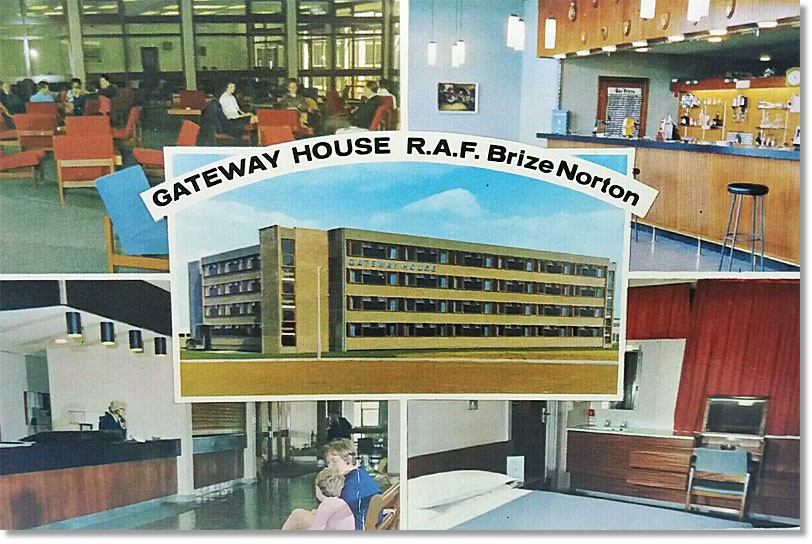
The aircraft was directly outside the Movements hangar and when I spotted the engineers all over it, l knew that wasn't good! Long story short - 24 hour delay and we left Sunday after I spent the night in the Gateway House (beggars can't be choosers!). Arrived at Leuchars and managed to sneak off before the loadmaster realised I was movements qualified!
Regards,
Steve Davey
Regards,
Steve Davey


Congratulations to George Graves!
Carlisle Villa Amateur Boxing Club -
Congratulations to Villa official [OBA Member] George Graves on receiving his Service to Sport award at the Carlisle Sports Awards on the weekend.
George started with the club as an assistant coach to Colin Nixon in mid/late 70's when we were known as Christus Rex ABC at Harraby, he became an ABA official firstly a judge then a referee and still to this day travels all over the North of England officiating on dozens of shows each year.
Pictured: Eileen and George Graves at the awards ceremony
Congratulations to Villa official [OBA Member] George Graves on receiving his Service to Sport award at the Carlisle Sports Awards on the weekend.
George started with the club as an assistant coach to Colin Nixon in mid/late 70's when we were known as Christus Rex ABC at Harraby, he became an ABA official firstly a judge then a referee and still to this day travels all over the North of England officiating on dozens of shows each year.
Pictured: Eileen and George Graves at the awards ceremony
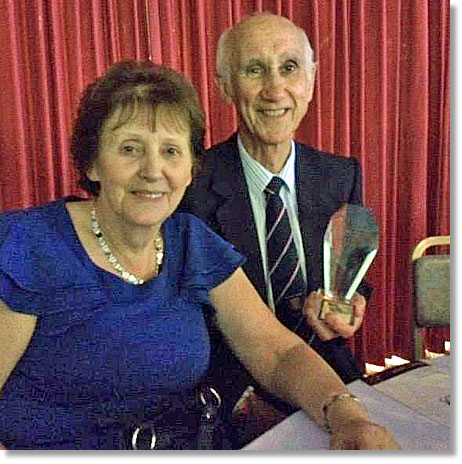

Today in Aviation History, First Flight of The YC-130 Hercules
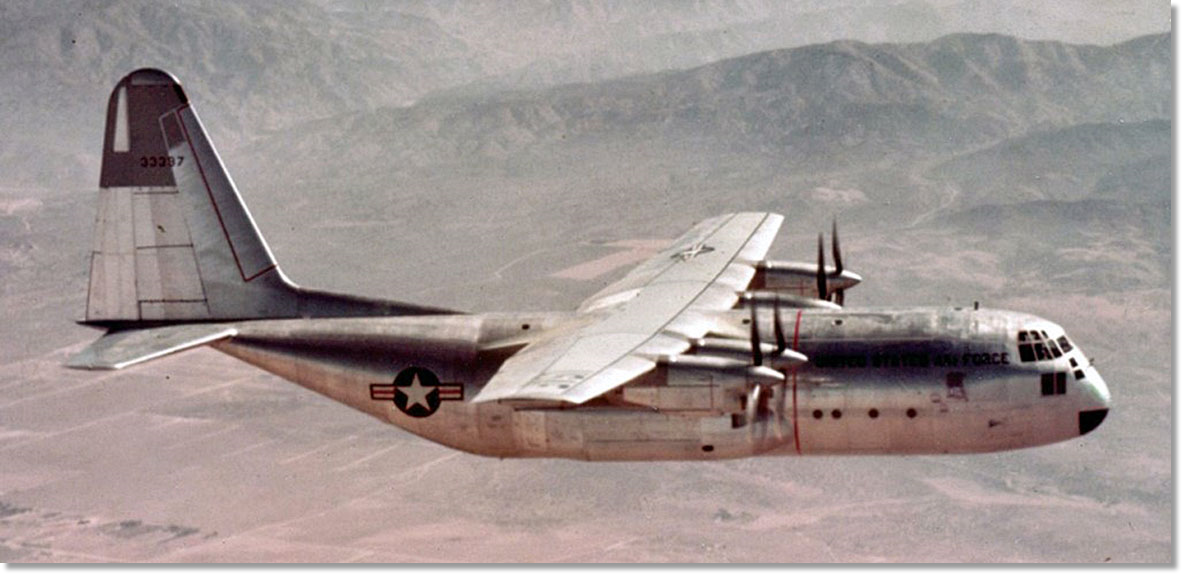
August 23rd, 2021 - It can be said without fear of contradiction that the C-130 Hercules is one of the most important aircraft in aviation history. Technically the C-130 Hercules is not a Warbird just yet, because it’s still operational within several of air arms across the globe. However, it’s such an iconic aircraft that every news item featuring its current flying exploits these days is worthy of mention.
In 1954, the song “Rock Around the Clock” was playing on the radio, Oprah Winfrey was born and the first issue of Sports Illustrated appeared on newsstands. The same year, on August 23, the YC-130 Hercules made its maiden flight at the Lockheed Martin plant in Burbank, California, and the C-130 is still in production today, making it the longest-running military aircraft production line in history.
The then-Lockheed Aircraft Corporation won the competition and was contracted to produce two prototype YC-130 aircraft on July 2, 1951. The first flight of YC-130 took place on Aug. 23, 1954, at Lockheed’s Burbank, California, plant. Its four turboprop engines enabled the YC-130 to take off in only 800 feet. In addition to its tremendous lift capability, the aircraft also proved to be far more maneuverable than expected while meeting or exceeding all of the other U.S. Air Force performance requirements.
The success of the prototypes led to a production contract. As the Burbank facility was at capacity, the entire C-130 program was moved to Lockheed’s facility—then known as Lockheed-Georgia Company—in Marietta, Ga. The first production C-130A, which was nearly identical to the prototypes, was flown for the first time at Marietta, Ga., on April 7, 1955. The C-130A featured four powerful Allison T56-A-lA turboprop engines, each delivering 3,750 horsepower and driving a three-bladed Curtiss-Wright electric-reversible propeller.
An early problem developed with the propeller pitch-changing mechanism was corrected by adopting a hydraulic model. A four-bladed Hamilton-Standard propeller was adopted, which was just the first of many updates, modifications, material and equipment changes, and other improvements over six decades that keep the Hercules state-of-the-art.
The C-130 is the most modified aircraft in the Air Force with multiple variants and hundreds of configurations, according to the Air Mobility Command Historian Office. The C-130 is used for airlift, aeromedical missions, personnel and cargo airdrop, natural disaster relief missions, Antarctic resupply to the National Science Foundation, weather reconnaissance, aerial spray missions, and firefighting duties for the U.S. Forest Service. The C-130 can airlift 92 ground troops, 64 fully-equipped paratroopers, 74 litter patients, or 45,000 pounds of cargo.
The C-130J, which is the latest version of the venerable platform, was introduced in February of 1999 and to date, 300+ were produced.
The C-130 continues to be the world’s standard for tactical airlift needs, especially in the form of the C-130J Super Hercules. The Super Hercules offers superior performance and new capabilities, with the range and flexibility for every theater of operations and evolving requirements. To date, 16 countries operate or will operate the C-130J, which has been used to set 54 world aviation records.
warbirdsnews.com
In 1954, the song “Rock Around the Clock” was playing on the radio, Oprah Winfrey was born and the first issue of Sports Illustrated appeared on newsstands. The same year, on August 23, the YC-130 Hercules made its maiden flight at the Lockheed Martin plant in Burbank, California, and the C-130 is still in production today, making it the longest-running military aircraft production line in history.
The then-Lockheed Aircraft Corporation won the competition and was contracted to produce two prototype YC-130 aircraft on July 2, 1951. The first flight of YC-130 took place on Aug. 23, 1954, at Lockheed’s Burbank, California, plant. Its four turboprop engines enabled the YC-130 to take off in only 800 feet. In addition to its tremendous lift capability, the aircraft also proved to be far more maneuverable than expected while meeting or exceeding all of the other U.S. Air Force performance requirements.
The success of the prototypes led to a production contract. As the Burbank facility was at capacity, the entire C-130 program was moved to Lockheed’s facility—then known as Lockheed-Georgia Company—in Marietta, Ga. The first production C-130A, which was nearly identical to the prototypes, was flown for the first time at Marietta, Ga., on April 7, 1955. The C-130A featured four powerful Allison T56-A-lA turboprop engines, each delivering 3,750 horsepower and driving a three-bladed Curtiss-Wright electric-reversible propeller.
An early problem developed with the propeller pitch-changing mechanism was corrected by adopting a hydraulic model. A four-bladed Hamilton-Standard propeller was adopted, which was just the first of many updates, modifications, material and equipment changes, and other improvements over six decades that keep the Hercules state-of-the-art.
The C-130 is the most modified aircraft in the Air Force with multiple variants and hundreds of configurations, according to the Air Mobility Command Historian Office. The C-130 is used for airlift, aeromedical missions, personnel and cargo airdrop, natural disaster relief missions, Antarctic resupply to the National Science Foundation, weather reconnaissance, aerial spray missions, and firefighting duties for the U.S. Forest Service. The C-130 can airlift 92 ground troops, 64 fully-equipped paratroopers, 74 litter patients, or 45,000 pounds of cargo.
The C-130J, which is the latest version of the venerable platform, was introduced in February of 1999 and to date, 300+ were produced.
The C-130 continues to be the world’s standard for tactical airlift needs, especially in the form of the C-130J Super Hercules. The Super Hercules offers superior performance and new capabilities, with the range and flexibility for every theater of operations and evolving requirements. To date, 16 countries operate or will operate the C-130J, which has been used to set 54 world aviation records.
warbirdsnews.com
This Newsletter is Dedicated
to the Memories of:
Tiri Manahi (RNZAF)
Anthony (Tony) Roe (RAF)
Clive (Russ) Russell (RAF)
John (Pedro) Pedersen (RAAF)
to the Memories of:
Tiri Manahi (RNZAF)
Anthony (Tony) Roe (RAF)
Clive (Russ) Russell (RAF)
John (Pedro) Pedersen (RAAF)
Tony Gale
ukmamsoba@gmail.com
If you wish to make a donation,
you may use the above e-mail
through PayPal.
.
ukmamsoba@gmail.com
If you wish to make a donation,
you may use the above e-mail
through PayPal.
.
